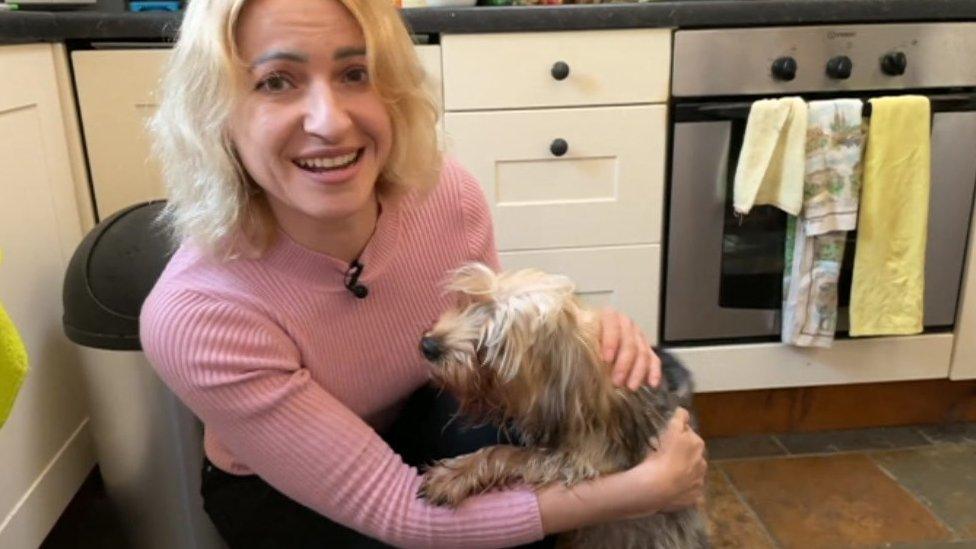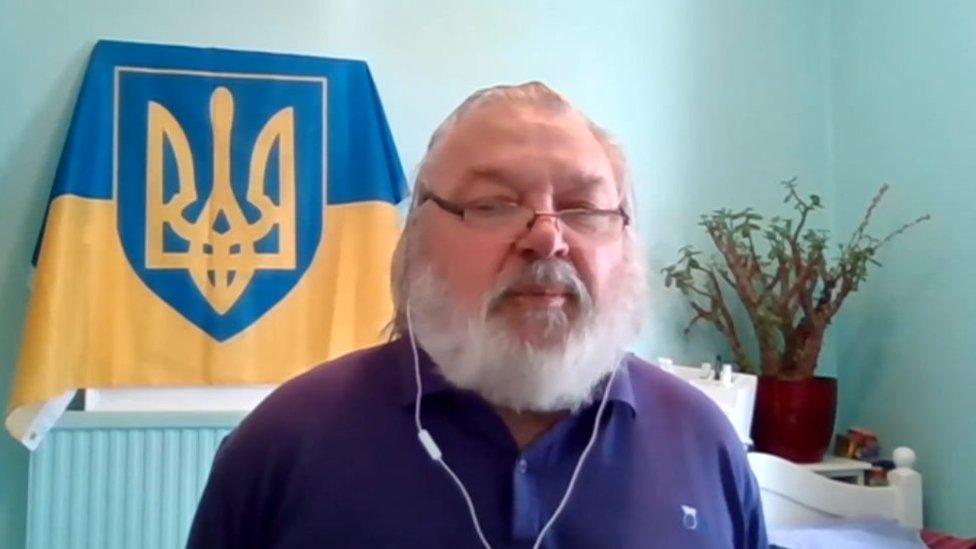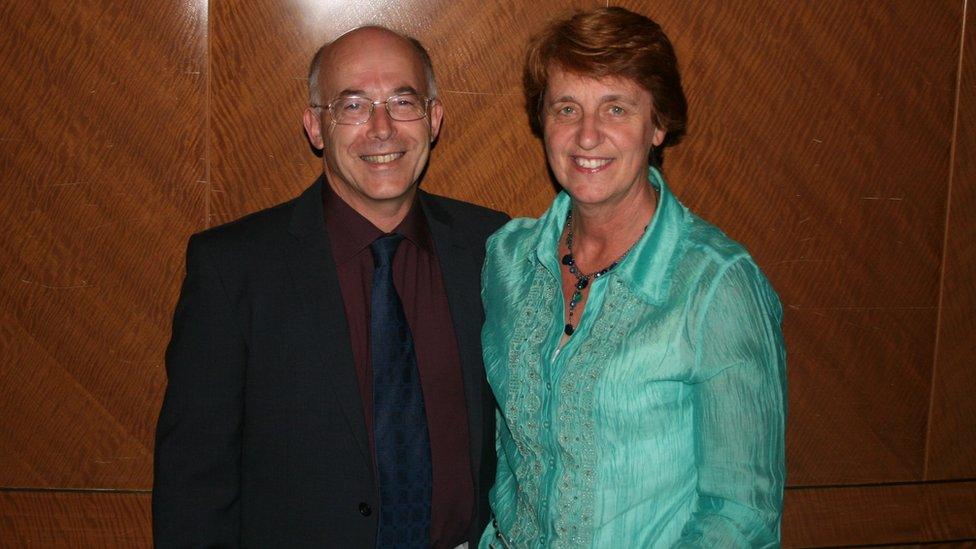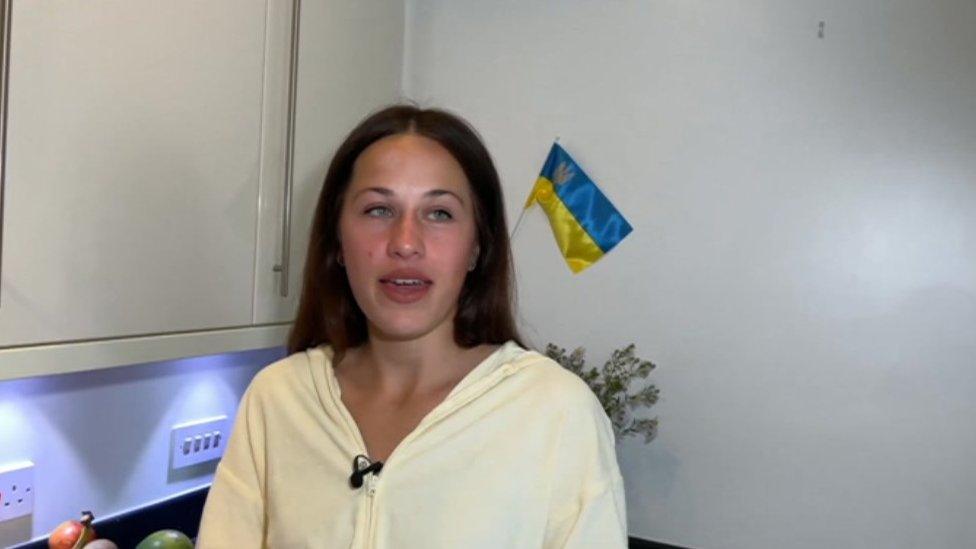Ukrainian refugees fear they will become homeless
- Published

Anfisa Vlasova and her four Yorkshire terriers are looking for a "friendly landlord" to take them in
Ukrainian refugees are worried they will be made homeless as their six-month-long housing placements come to an end.
Government data seen by the BBC shows at least 127 Ukrainian households were either homeless or at risk of becoming homeless in the south of England at the end of last month.
More than half of those are families with children.
The government said councils have a duty to find them accommodation.
The statistics show 74 households are either homeless or at risk in Hampshire, 27 in Oxfordshire, 14 in Reading and 12 from the Bournemouth, Christchurch and Poole area.
Anfisa Vlasova is currently living with her four Yorkshire terriers in Gallowstree Common, just outside of Reading, but has to move by November.
The refugee from Kharkiv said she is "scared of what will happen".
"I pray for a miracle, because only a miracle can help us find accommodation with a friendly landlord," she said.

Mick Polleck said the situation was "leading to anxiety" for Ukrainians
Mick Polleck is from Reading's Ukrainian Community Centre and said the upheaval was leading to "anxiety, illness and stress".
He said Ukrainians were "a proud people" and did not want to be seen to be "moaning".
"They're grateful for the help, but they can't walk the streets," he said. "They can't be shunted from hotel room to hotel room."
The reasons people are ending their involvement with the Homes for Ukraine scheme can be complex.
Sometimes the accommodation is unsuitable, but hosts the BBC spoke with cited difficulties living with strangers and the language barrier.
One host in Berkshire said a Ukrainian family "took over her house entirely, making her feel like a visitor in her own home".
Another host from Hampshire, who has given a family of four notice to leave at the end of their six months, told the BBC cooking separately in a shared kitchen caused friction.
There was also concern about spiralling fuel bills with the cost-of-living crisis.

David Frankl said things "soured" with the first Ukrainian family but he and wife Astrid have taken in a second family
David Frankl and his wife Astrid, from Wimborne in Dorset, took in a family of five from the devastated city of Mariupol in April.
But the relationship "soured" and in July the family moved out.
"I started talking about what would happen next and first steps to independence, about renting a flat and so on, and he [the father] just wanted a car and another sponsor," Mr Frankl said.
"His brother was in Cheshire and he wanted to be there."
The family were now living in council-funded accommodation elsewhere in the county, he added.
But he said the experience had not deterred them, and they had just welcomed a mother and her two children into their home.
"The need is still there," said Mr Frankl, whose parents fled Nazi Germany.

Olena Kovalenko is grateful the authorities found a flat for her family after spending weeks in a hotel room
Olena Kovalenko and her husband Oleksandr, a lawyer, fled Ukraine with their daughter two days before war broke out.
They were taken in by a family in Goring, Berkshire, for two months but had to leave.
South Oxfordshire District Council put them up in a Travelodge before recently finding them a housing association flat in Cholsey.
A government spokesperson said: "The majority of sponsors want to continue hosting for longer than six months.
"Where guests do move on, they have a number of options, including to enter private rental and find a new host to sponsor them.
"Councils have a duty to ensure families are not left without a roof over their heads,
"All arrivals have access to benefits and employment from day one and we are giving councils an extra £10,500 per person cover any extra costs."

Follow BBC South on Facebook, external, Twitter, external, or Instagram, external. Send your story ideas to south.newsonline@bbc.co.uk, external.